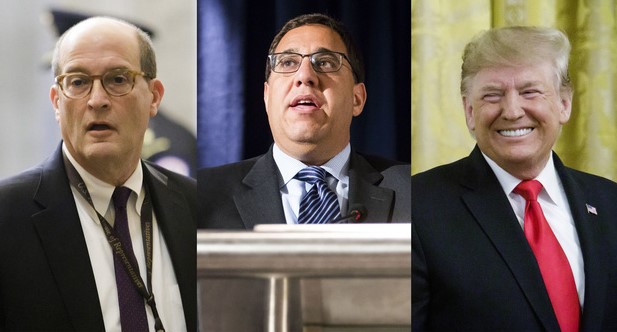In Rare Unity, Trump, DOJ and House All Urge Justices to Resolve Subpoena Fights
Each legal team agreed the U.S. Supreme Court should not throw out the House subpoena cases over the political question doctrine but instead issue a ruling on the merits.
May 08, 2020 at 02:57 PM
5 minute read
 (l-r) Douglas Letter, William Consovoy and Donald Trump.
(l-r) Douglas Letter, William Consovoy and Donald Trump.
Lawyers for President Donald Trump, the Department of Justice and the House of Representatives were in rare agreement Friday, telling the U.S. Supreme Court it should not throw out the president's lawsuits challenging congressional subpoenas for his tax documents.
The justices last week requested the parties and DOJ say whether the political question doctrine—which blocks courts from weighing in on political matters best handled by the other branches—applied to the fights over the House subpoenas to financial institutions housing the records.
In three supplemental briefs filed with the court Friday, the DOJ, Trump and House lawyers all told the justices the cases are justiciable and urged them to issue a ruling on the merits.
"No one urged the courts below to refrain from resolving the lawsuits that President Trump and related persons and entities had brought. The committees and President Trump had good reasons for agreeing that the courts should resolve these disputes," House general counsel Douglas Letter wrote.
The House further argued that a ruling from the court "that a subpoena controversy involving congressional committees and the president is not subject to judicial resolution would be a mistake."
"But, if this court has concerns about deciding the merits of this particular dispute, there is a way out, short of a major pronouncement on justiciability: the court could dismiss the writs as improvidently granted, leaving in place the judgments of the courts of appeals," the House brief reads. The House has won the cases over subpoenas to Mazars, Deutsche Bank and Capital One at both the U.S. Court of Appeals for the D.C. and Second Circuits.
Trump's private attorneys with Consovoy McCarthy similarly warned the court against finding the cases are nonjusticiable, saying such a ruling "would have sweeping ramifications."
"It would not only disable the president from challenging congressional subpoenas for his private records. It would mean … that nobody—not even ordinary individuals, associations and businesses—may judicially contest a congressional subpoena," attorney William Consovoy wrote. "If the legitimate-legislative-purpose test is unmanageable, after all, then the issue is a political question irrespective of the parties' identity. Abandoning this well-worn judicial inquiry into the legitimacy of congressional subpoenas would overturn 139 years of precedent without any justification for doing so."
And solicitor general Noel Francisco echoed those arguments in his supplemental brief. He told the justices their request for briefing on the political question doctrine "points at an understandable concern," but this dispute differs from court fights between the executive and legislative branches because the subpoenas are issued to third parties and Trump is suing in his personal capacity.
"Refusing to adjudicate the merits of this dispute would in effect give congressional committees free rein to issue subpoenas to any third-party custodian without any meaningful checks or balances, because such third parties often would be inclined to comply (as the third parties in these cases have indicated they will)," the Justice Department's brief reads. "The president would be stripped of any ability to prevent disclosures that are sought as an end-run around the negotiation and accommodation process, and courts would be deprived of any ability to review whether the committees had the power to issue the subpoenas in the first instance."
The U.S. Supreme Court is set to hear arguments Tuesday in the disputes over the congressional subpoenas. The cases have been making their way through the federal courts for more than a year and will be heard the same day as a challenge to a subpoena from the Manhattan district attorney for Trump's tax records.
Trump's Consovoy McCarthy legal team argues that lawmakers lacked a legitimate legislative purpose to issue the subpoenas, and were issued as a form of "law enforcement" or attempt to unearth political dirt about Trump. The Justice Department has also urged courts to strike down the subpoenas.
Judge David Tatel of the U.S. Court of Appeals for the District of Columbia, who wrote the court's majority opinion upholding the Mazars subpoena, raised the justices's requested briefing during oral arguments last week in another pair of House lawsuits.
He asked DOJ attorney Hashim Mooppan if the Justice Department would ever raise the political question doctrine in the case over testimony from former White House counsel Don McGahn or a challenge to Trump's use of military funds for border wall construction. Mooppan replied that the agency did not plan on invoking the doctrine in those cases.
Read more:
Justices Ask if They're Barred From Ruling on Trump Tax Cases in New Hurdle for US House
Mazars, Impeachment & Mueller: Judges Review House's Year of Trump Legal Fights
Treasury IG Says Mnuchin, Leaning on OLC, Properly Withheld Trump's Tax Returns. Will a Judge Agree?
This content has been archived. It is available through our partners, LexisNexis® and Bloomberg Law.
To view this content, please continue to their sites.
Not a Lexis Subscriber?
Subscribe Now
Not a Bloomberg Law Subscriber?
Subscribe Now
NOT FOR REPRINT
© 2025 ALM Global, LLC, All Rights Reserved. Request academic re-use from www.copyright.com. All other uses, submit a request to [email protected]. For more information visit Asset & Logo Licensing.
You Might Like
View All
‘Diminishing Returns’: Is the Superstar Supreme Court Lawyer Overvalued?

DC Lawsuits Seek to Prevent Mass Firings and Public Naming of FBI Agents
3 minute read
Trending Stories
- 1Pistachio Giant Wonderful Files Trademark Suit Against Canadian Maker of Wonderspread
- 2New York State Authorizes Stand-Alone Business Interruption Insurance Policies
- 3Buyer Beware: Continuity of Coverage in Legal Malpractice Insurance
- 4‘Listen, Listen, Listen’: Some Practice Tips From Judges in the Oakland Federal Courthouse
- 5BCLP Joins Saudi Legal Market with Plans to Open Two Offices
Who Got The Work
J. Brugh Lower of Gibbons has entered an appearance for industrial equipment supplier Devco Corporation in a pending trademark infringement lawsuit. The suit, accusing the defendant of selling knock-off Graco products, was filed Dec. 18 in New Jersey District Court by Rivkin Radler on behalf of Graco Inc. and Graco Minnesota. The case, assigned to U.S. District Judge Zahid N. Quraishi, is 3:24-cv-11294, Graco Inc. et al v. Devco Corporation.
Who Got The Work
Rebecca Maller-Stein and Kent A. Yalowitz of Arnold & Porter Kaye Scholer have entered their appearances for Hanaco Venture Capital and its executives, Lior Prosor and David Frankel, in a pending securities lawsuit. The action, filed on Dec. 24 in New York Southern District Court by Zell, Aron & Co. on behalf of Goldeneye Advisors, accuses the defendants of negligently and fraudulently managing the plaintiff's $1 million investment. The case, assigned to U.S. District Judge Vernon S. Broderick, is 1:24-cv-09918, Goldeneye Advisors, LLC v. Hanaco Venture Capital, Ltd. et al.
Who Got The Work
Attorneys from A&O Shearman has stepped in as defense counsel for Toronto-Dominion Bank and other defendants in a pending securities class action. The suit, filed Dec. 11 in New York Southern District Court by Bleichmar Fonti & Auld, accuses the defendants of concealing the bank's 'pervasive' deficiencies in regards to its compliance with the Bank Secrecy Act and the quality of its anti-money laundering controls. The case, assigned to U.S. District Judge Arun Subramanian, is 1:24-cv-09445, Gonzalez v. The Toronto-Dominion Bank et al.
Who Got The Work
Crown Castle International, a Pennsylvania company providing shared communications infrastructure, has turned to Luke D. Wolf of Gordon Rees Scully Mansukhani to fend off a pending breach-of-contract lawsuit. The court action, filed Nov. 25 in Michigan Eastern District Court by Hooper Hathaway PC on behalf of The Town Residences LLC, accuses Crown Castle of failing to transfer approximately $30,000 in utility payments from T-Mobile in breach of a roof-top lease and assignment agreement. The case, assigned to U.S. District Judge Susan K. Declercq, is 2:24-cv-13131, The Town Residences LLC v. T-Mobile US, Inc. et al.
Who Got The Work
Wilfred P. Coronato and Daniel M. Schwartz of McCarter & English have stepped in as defense counsel to Electrolux Home Products Inc. in a pending product liability lawsuit. The court action, filed Nov. 26 in New York Eastern District Court by Poulos Lopiccolo PC and Nagel Rice LLP on behalf of David Stern, alleges that the defendant's refrigerators’ drawers and shelving repeatedly break and fall apart within months after purchase. The case, assigned to U.S. District Judge Joan M. Azrack, is 2:24-cv-08204, Stern v. Electrolux Home Products, Inc.
Featured Firms
Law Offices of Gary Martin Hays & Associates, P.C.
(470) 294-1674
Law Offices of Mark E. Salomone
(857) 444-6468
Smith & Hassler
(713) 739-1250









